Want to Mix Like a Pro? Get Step-by-Step Training for Just $97!
Skip the $19,000 Tuition—Learn Pro Mixing, Fast, for Just $97!
Master Studio-Quality Mixing & Audio Engineering
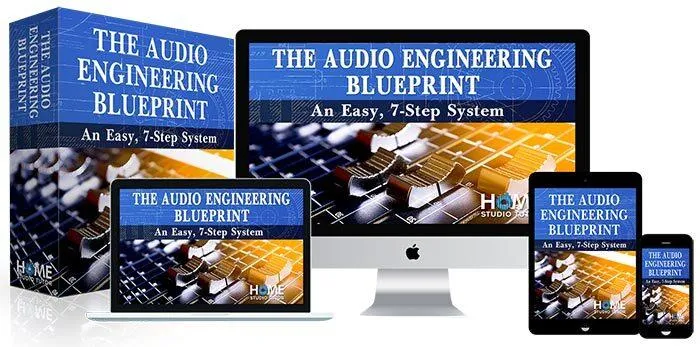
Your mixes don’t sound how you want them to. Maybe they’re muddy, weak, or don’t stand up to commercial tracks.
You’ve tried YouTube tutorials, random tips, and guesswork—but you’re still not getting clear, professional mixes.
That’s why I created The Audio Engineering Blueprint.
Inside, you’ll get step-by-step, real-world training that teaches you how to mix and master like a pro—FAST
Normally $297, but today, you can get lifetime access for just $97.
No fluff. No frustration. Just real mixing skills you can use immediately.
CLICK BELOW TO GET INSTANT ACCESS

Inside The Audio Engineering Blueprint, You’ll Learn:
Fix Muddy Mixes & Balance Issues (EQ, Compression & Leveling for Pro Clarity)
Get That Radio-Ready Sound (Industry Mixing & Mastering Techniques)
Mix Vocals Like a Pro (Make Your Vocals Stand Out & Shine)
Make Your Drums & 808s Punch Harder (Tight, Professional Drum Processing)
Mix with Confidence in Any DAW (Pro Tools, Logic Pro X & FL Studio Demos)
Make Your Mixes Translate Anywhere (Car, Speakers, Headphones—It All Sounds Good!)
All for just $97—Normally $297!
Learn Pro Studio Techniques From a 25+ Year Audio Engineer Who’s Worked With Hundreds of Artists
My name is Samori Coles. For over 25 years, I’ve helped artists across hip-hop, R&B, rock, gospel, jazz, pop, and more, record, mix, and master professional-quality music.
Now, for the first time, I’m sharing the exact system I teach at my recording studio and audio engineering school - online, self-paced, and easy to follow.
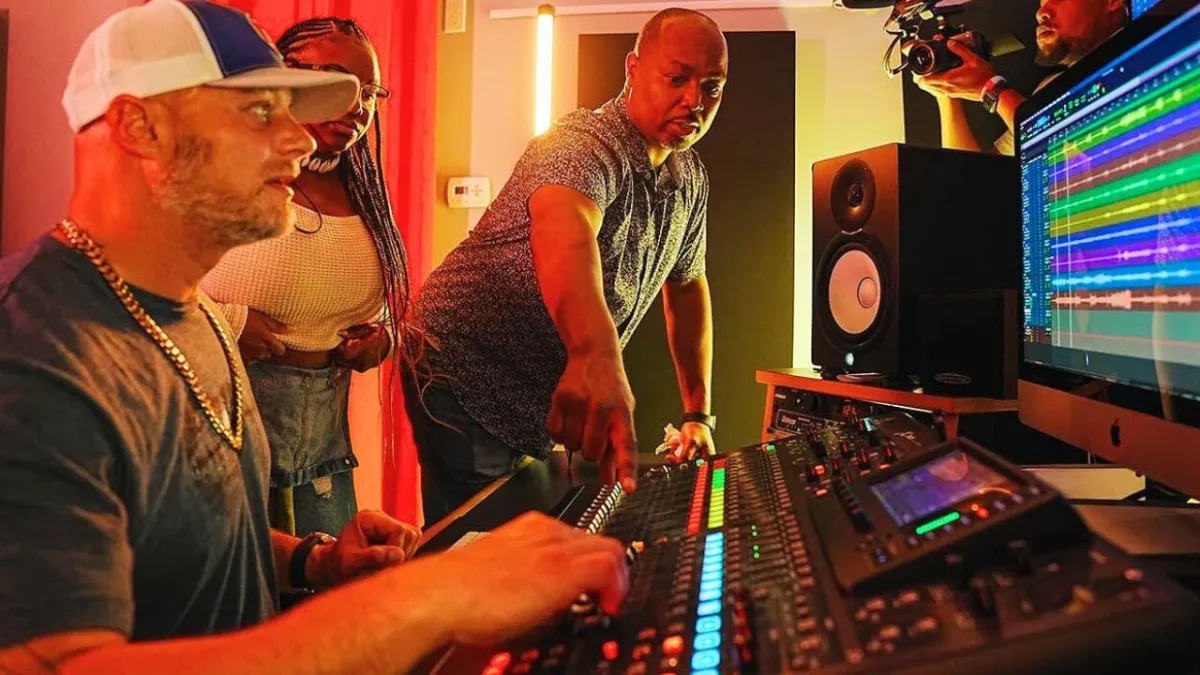
Here's what you'll get:
The same techniques I use in real recording sessions every day
The step-by-step system I’ve taught to hundreds of students — including two Grammy nominees
No more guessing — just follow the process to get cleaner, clearer mixes
See pro mixing techniques demonstrated in Pro Tools, Logic Pro X, and FL Studio — the industry’s leading software for recording and mixing.
Learn at your own pace — with lifetime access for just $97
Whether you want to upgrade your own sound or start mixing for paying clients, The Audio Engineering Blueprint gives you the skills you need — without wasting years on trial and error.
IS THIS YOU?
You produce your own music but your mixes never sound right
You’ve wasted hours on YouTube trying to piece together conflicting advice
You want a step-by-step system trusted by real artists & engineers
You’re tired of sending your tracks to engineers who don’t get your vision
You want a shortcut to industry-ready sound — without the guesswork
Whether you're an artist, producer, engineer, or total beginner, this Blueprint gives you the exact process we use every day to deliver pro mixes.
And it’s yours today for just $97!
Here's Exactly What You'll Learn Inside "The Audio Engineering Blueprint"...
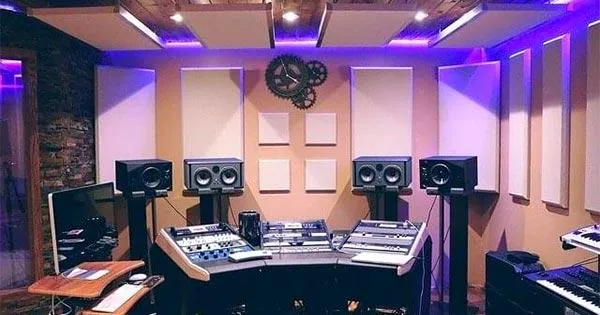
The Secrets To Rocking Your Room Acoustics & Getting The Best Sound In Any Space
What you will learn:
How to calculate your room modes so that you will better understand the overall color of your space
The difference between the various types of acoustic treatments so that you can choose the
best option for your space, and not waste time and money in the process
The optimal placement for acoustic treatment
to most effectively control room echo and reflections
The inside scoop on the most affordable resources for acoustic treatment
Recording Gear Rules That Every Home Studio Owner Needs To Follow (What You Need, What You Don’t, And What Makes All The Difference)
What you will learn:
How to get professional quality results with gear that you already own
Which pieces of equipment are essential to taking your sound to the next level
Why you don’t need certain pieces of gear
If the Mac vs. PC debate is really worth the argument
The one piece of gear that can truly be a game-changer
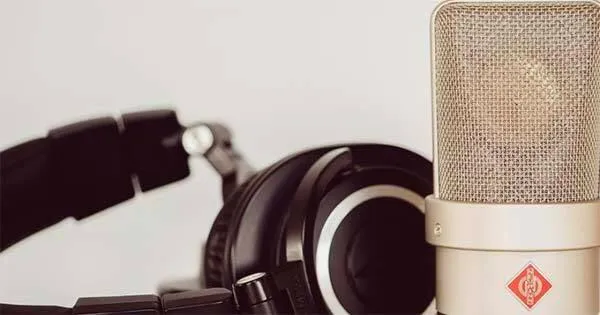
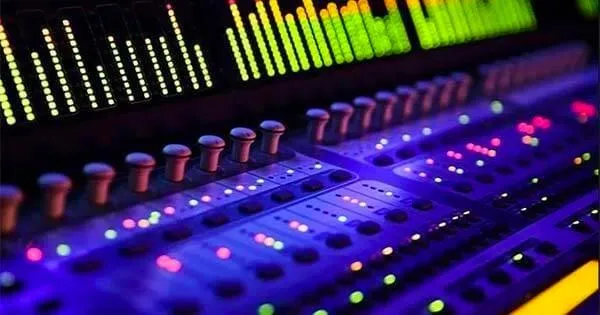
The Very Best Levels To Record Your Vocals At (Spoiler: It’s Not 0 dB)
What you will learn:
Why your recording level is the most important factor in the signal flow chain
The optimal level to record your vocals
Which piece of recording gear has the biggest impact on recording levels
Why ignoring recording levels is ruining your recordings
Everything You Need To Know About Equalization (EQ) To Take Your Sound To The Next Level
What you will learn:
To better understand frequency, and how it affects your perception of sound
The role that equalizers play in achieving radio-quality mixes
The essential frequencies that you need to know to get professional quality results
How to effectively use an equalizer to become an audio ninja
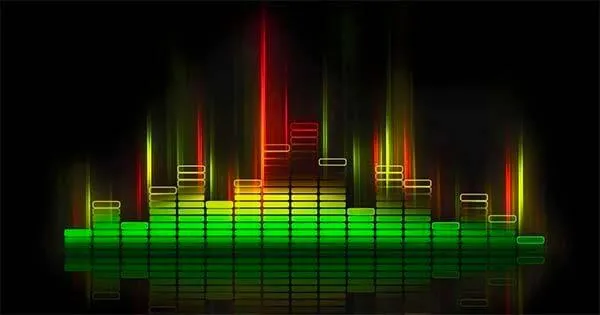
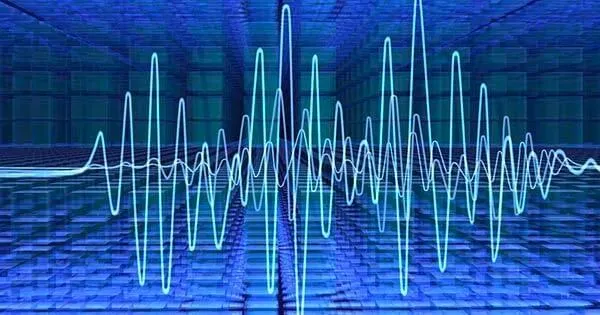
Understanding One Of The Most Vital Elements Of Recording: Compression
What you will learn:
How to use a compressor to your advantage
Secret compression recipes that will supercharge your mixes
How to use compressors to achieve louder, punchier recordings
The essential parameters of compression
Is It Balanced? The Ultimate Lesson In Mixing
What you will learn:
Why balance is the core ingredient of audio mixing
A little-known mixing technique that will consistently lead to more balanced mixes
How to use “references” to produce industry-quality recordings
The ultimate tools used for balance
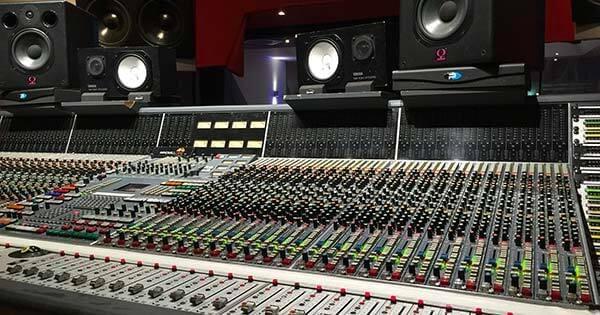
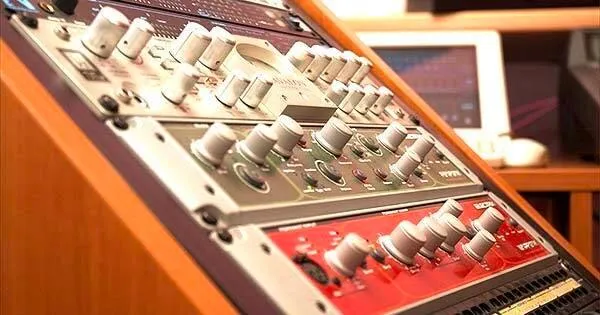
Elevate Your Vocal Sound With Audio Effects And Processing
What you will learn:
The audio effects that dominate major label recordings
How to use reverb to get the sound that you’ve been looking for
Why delay is the one effect that you need to start using now
How distortion can liven up your vocal recordings
Bonus Package (Over $1,500 in Value!)
Register for The Audio Engineering Blueprint today and you’ll also get these exclusive bonuses — absolutely free:
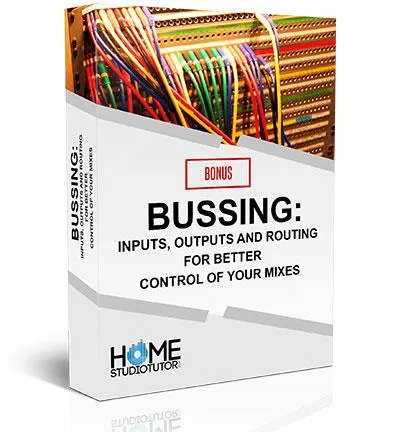
BUSSING
(value: $397)
Understanding the concept and application of 'Bussing' is separates beginners from professional audio engineers. Essentially, bussing is routing. When applied correctly, there are endless applications that can give an audio engineer more control of their mixes, and a wider variety of sonic textures to employ.
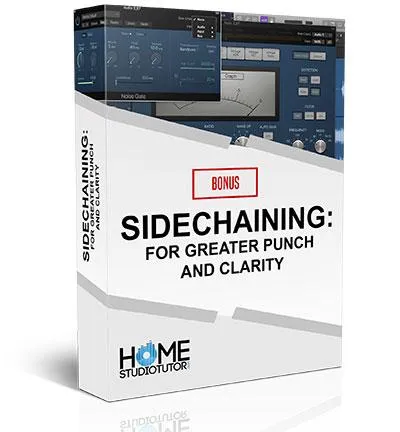
SIDECHAINING
(value: $297)
'Sidechaining' is often thought of as a music production tool used to create that famous "pumping" effect that is heard in countless dance records. However, there are numerous ninja sidechaining techniques that can help vocals stand out in a mix, create punch, clarity, and so much more.
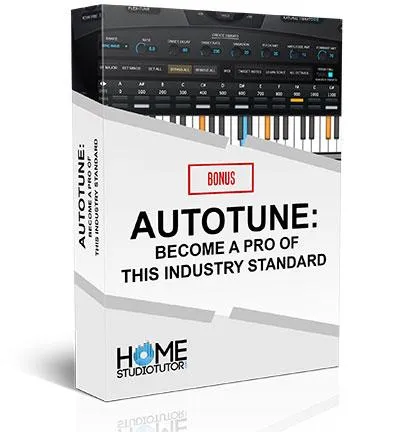
AUTOTUNE
(value: $297)
Anyone who has listened to popular music in the last 10 years is definitely familiar with the sound of 'Autotune'. This robot-like effect that is often applied to vocals is a staple in modern mixes. Understanding how to properly use autotune can be the difference between a high-quality, industry standard record, or a low-grade, basement sounding demo.
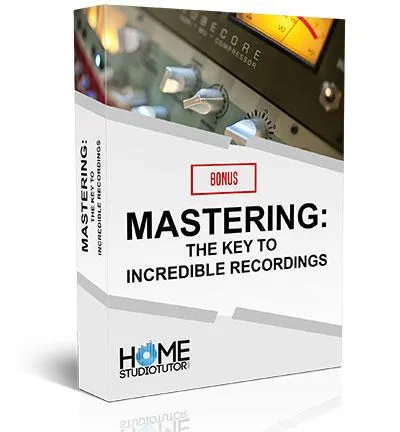
MASTERING
(value: $497)
'Mastering' is literally the final phase of the audio production process. It is the icing on the cake. Recordings that are mastered have a balanced frequency spectrum, are louder and punchier, and are able to compete against the sound of major label recordings. As an audio engineer, knowing how to master will add unlimited value to your skillset.
Here's Exactly What You'll Learn Inside "The Audio Engineering Blueprint"...
The Secrets To Rocking Your Room Acoustics & Getting The Best Sound In Any Space

What you will learn:
How to calculate your room modes so that you will better understand the overall color of your space
The difference between the various types of acoustic treatments so that you can choose the
best option for your space, and not waste time and money in the process
The optimal placement for acoustic treatment
to most effectively control room echo and reflections
The inside scoop on the most affordable resources for acoustic treatment
Recording Gear Rules That Every Home Studio Owner Needs To Follow (What You Need, What You Don’t, And What Makes All The Difference)

What you will learn:
How to get professional quality results with gear that you already own
Which pieces of equipment are essential to taking your sound to the next level
Why you don’t need certain pieces of gear
If the Mac vs. PC debate is really worth the argument
The one piece of gear that can truly be a game-changer
The Very Best Levels To Record Your Vocals At (Spoiler: It’s Not 0 dB)

What you will learn:
Why your recording level is the most important factor in the signal flow chain
The optimal level to record your vocals
Which piece of recording gear has the biggest impact on recording levels
Why ignoring recording levels is ruining your recordings
Everything You Need To Know About Equalization (EQ) To Take Your Sound To The Next Level

What you will learn:
To better understand frequency, and how it affects your perception of sound
The role that equalizers play in achieving radio-quality mixes
The essential frequencies that you need to know to get professional quality results
How to effectively use an equalizer to become an audio ninja
Understanding One Of The Most Vital Elements Of Recording: Compression

What you will learn:
How to use a compressor to your advantage
Secret compression recipes that will supercharge your mixes
How to use compressors to achieve louder, punchier recordings
The essential parameters of compression
Is It Balanced? The Ultimate Lesson In Mixing

What you will learn:
Why balance is the core ingredient of audio mixing
A little-known mixing technique that will consistently lead to more balanced mixes
How to use “references” to produce industry-quality recordings
The ultimate tools used for balance
Elevate Your Vocal Sound With Audio Effects And Processing

What you will learn:
The audio effects that dominate major label recordings
How to use reverb to get the sound that you’ve been looking for
Why delay is the one effect that you need to start using now
How distortion can liven up your vocal recordings
Bonus Package (Over $1,500 in Value!)
Register for The Audio Engineering Blueprint today and you’ll also get these exclusive bonuses — absolutely free:

BUSSING
(value: $397)
Understanding the concept and application of 'Bussing' is separates beginners from professional audio engineers. Essentially, bussing is routing. When applied correctly, there are endless applications that can give an audio engineer more control of their mixes, and a wider variety of sonic textures to employ.

SIDECHAINING
(value: $297)
'Sidechaining' is often thought of as a music production tool used to create that famous "pumping" effect that is heard in countless dance records. However, there are numerous ninja sidechaining techniques that can help vocals stand out in a mix, create punch, clarity, and so much more.

AUTOTUNE
(value: $297)
Anyone who has listened to popular music in the last 10 years is definitely familiar with the sound of 'Autotune'. This robot-like effect that is often applied to vocals is a staple in modern mixes. Understanding how to properly use autotune can be the difference between a high-quality, industry standard record, or a low-grade, basement sounding demo.

MASTERING
(value: $497)
'Mastering' is literally the final phase of the audio production process. It is the icing on the cake. Recordings that are mastered have a balanced frequency spectrum, are louder and punchier, and are able to compete against the sound of major label recordings. As an audio engineer, knowing how to master will add unlimited value to your skillset.
Hear From Real Students — Both In-Studio & Online — Who Used This Same System to Transform Their Skills and Careers
Watch Their Stories
"Before this course, the songs that I was making weren't sounding consistent on different listening devices. I absolutely recommend."
- Andrew Brown
"I came into the program with little to no recording knowledge. Today I'm a full-time audio engineer and music producer."
- Mike Moore
"I learned the technical aspects of sound, which is what we deal with as music artists. The course and assignments were powerful."
- Alexa Gold
"The program helped me transition to a full-time career as an audio-visual technician. Right away, I learned the skills I needed."
- Keith Gutierrez
"After graduating from the program, I've had the opportunity to work with Grammy-winning artists."
- AJ Olivero
"I wanted to take my music to the next level. The process was incredible. Every week, I kept going to another level."
- Geronimo Santana
What Students Are Saying:

Felicia Ricci
“Working with Samori was instrumental to my developing my confidence as a producer and artist. I’m glad I met [him] when I did. I feel empowered now to be truly be creative.”

John Morrison
“Working with Samori was hands down one of the most influential experiences in my creative life. In addition to the growth in the music I make, I learned so much about the business.”
You could easily pay thousands for this type of real-world training — but today, it’s yours for just $97.
Why Only $97?
Why So Affordable?
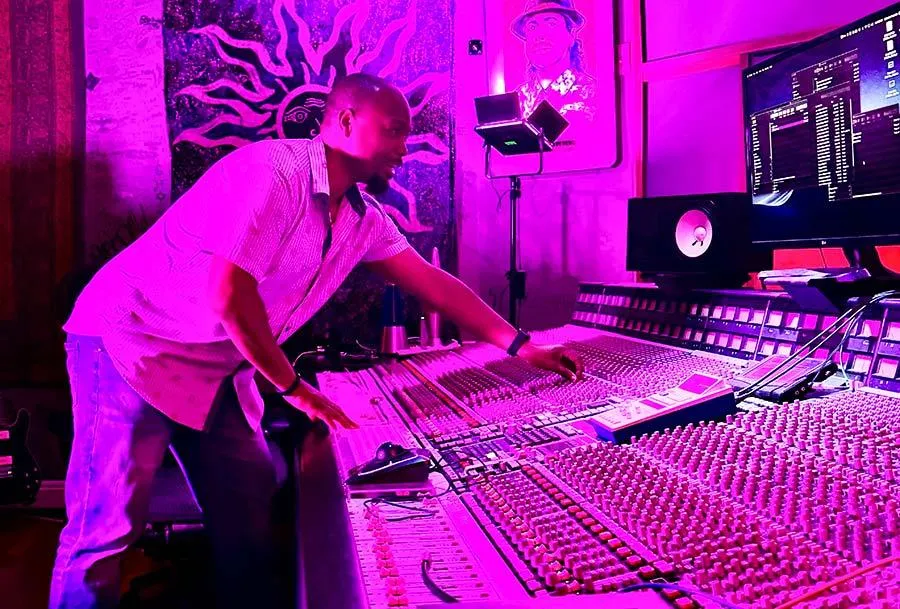
With over 25 years in the industry, I’ve worn just about every audio engineering hat you can imagine. I’m a studio owner, a member of the Recording Academy — the organization behind the Grammy Awards — and I’ve worked on:
Recording, mixing, and mastering music across hip-hop, R&B, rock, pop, and more
Podcasts, audiobooks, and audio for film, TV, and radio
Acoustic design for commercial studios, home studios, and even churches
For the past 20 years, I’ve also taught hundreds
of aspiring engineers, producers, and artists both in-studio and online, helping them master these same skills and turn their passion into professional careers — including students who’ve gone on to earn Grammy nominations.
My in-studio and one-on-one coaching students have paid up to $5,500 for this exact same curriculum. Compare that to traditional Audio Engineering Schools, where tuition averages
$19,000, and can go as high as $80,000.
But I believe pro-quality audio training should be accessible to everyone — no matter your budget or background.
That’s why I created The Audio Engineering Blueprint — so you can get the
same step-by-step system I teach in my studio for just $97.
No inflated tuition.
No piecing together random YouTube tutorials.
Just real studio techniques from a working engineer — at a price anyone can afford.
This isn’t about making a quick sale — it’s about giving back to the next generation of audio creators and helping you build the skills and confidence to make music you’re proud of.
That’s why you can get instant lifetime access today for just $97.
7-Day Money-Back Guarantee
100% Risk-Free

I'm so confident this Blueprint will level up your mixes and your skills, I'm backing it with a 100% Money-Back Guarantee.
If you’re not blown away by what you learn, just email me within 7 days for a full refund — no questions asked.
You have nothing to lose… except bad mixes.
Don't miss this limited-time offer!
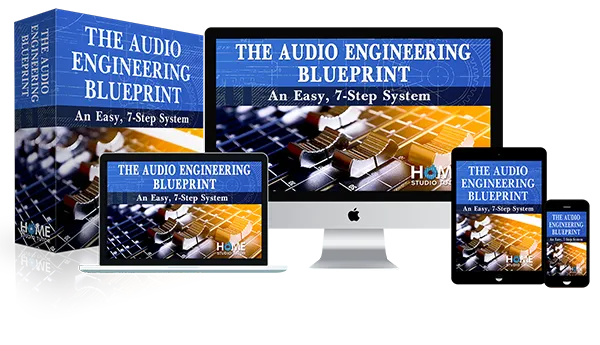
Get industry-level audio training for just $97 (Normally $297)
Lifetime access—no subscriptions or hidden fees!
Learn step-by-step with real mixing demonstrations in Pro Tools, Logic Pro X & FL Studio
Click Below to Start Learning Now!

3 CONVENIENT PAYMENT OPTIONS:
2 Monthly Payments
$297/mo.
Full Payment
$497/mo.
3 Monthly Payments
$227/mo.
Your information is 100% secure with us.
Frequently Asked Questions
How Long Do I Have Access?
Lifetime access — come back anytime, at your own pace.
Do I have To Have Experience To Enroll In The Program?
Not all. Some of our students are absolute beginners. These students tend to do very well in our program because they haven’t picked up a lot of bad audio engineering habits.
How Long Will This Course Be $97?
This special $97 pricing is only available for a limited time. After that, the price will increase significantly to reflect the full value of the training.
If you want to lock in lifetime access for just $97, now’s the time.
When Do Classes Start?
This is an online course that allows you to learn at your own pace. You'll get instant access as soon as you enroll.
Do You Offer A Guarantee?
We offer a 100% money-back guarantee within 7 days.
Is There An Age Requirement?
There is no age requirement to register for the Audio Engineering Blueprint.
What Software Will I Be Learning?
In today’s music industry, there are a number of popular software programs that our students like to use. Our core training is the craft of Audio Engineering, which is the same regardless of the software program used. We provide project demonstrations in Pro Tools, Logic Pro X, and FL Studio.
What Equipment Do I Need To Start The Program?
It is highly recommended that you, at least, have a computer and D.A.W. (i.e. recording software), as well as studio monitors or a decent pair of studio headphones. Equipment specs and recommendations are covered in the 2nd module of the program. So, if you're not sure about what to get, it will be addressed in the course.
Is This A Live Class?
No, this program consists of pre-recorded training videos, project files, quizzes, and software (D.A.W.) demonstrations. This way you are able to work at your own pace.
How Long Does It Take To Complete The Course?
It is recommended that you pace yourself, watch all of the videos, complete the quizzes, and finish all assignments. In terms of course completion, 8-12 weeks is ideal for optimal retention, growth, and development in the craft of audio engineering.
Will This Program Allow Me To Get A Job In The Music Industry?
The music industry is extremely competitive. We believe in our program so much that we know that you’ll be prepared when you complete the course.
There are no guarantees that companies will be hiring, or will hire you. But, you’ll be 10x more experienced, trained and prepared than you are today.
How Is Your School Different From Other Schools?
Samori Coles began his career more than 25 years ago as an independent artist and music producer. He built Lil’ Drummaboy Recordings, a Philadelphia-based recording studio and audio training facility, to provide other independents with the training, guidance, and mentorship that he wishes he had all those years ago.
He understands your unique needs. And he knows exactly what you need to accomplish your goals.
There is no fluff in The Audio Engineering Blueprint. You will get real-world training that will significantly develop your proficiency and skills as an audio engineer. We can guarantee this because we have been training music creators just like yourself for more than 20 years.
Our online program is the exact same curriculum taught in-studio at Lil' Drummaboy Recordings. The success rate of our graduates is second-to-none. This is the training that you have been looking for.
Will I Learn How To Make Beats In This Program?
No. The Audio Engineering Blueprint focuses on the craft of audio engineering. You will be trained to record, edit, mix, and master music and audio projects at a professional level.
Audio Engineers are the folks in the studio that handle the recording process. They make sure that the projects that they engineer have that major-label quality that is competitive with the music of other artists in the industry.
What Is Audio Engineering?
Audio Engineering is the process of recording, editing, mixing, and/or mastering audio projects.
Audio Engineers work in the music industry, film industry, radio, TV, podcasts, live sound, audio/visual departments in colleges and companies, etc. They are sonic anchors that ensure that any of the sound involved in any of these industries is of the highest quality.
While many of our students have a desire to either work in the music industry or achieve better sounding recordings in their home studios, there are many career options for audio engineers.
Audio Engineering is a trade similar to plumbing, audio mechanics, carpentry, etc. It’s a specific skillset that offers unique opportunities that many aspiring music creators aren’t aware of.
Is This An Online Or In-Person Program?
The Audio Engineering Blueprint is an online program.
copyright © 2025 Lil' Drummaboy Recordings, LLC.
